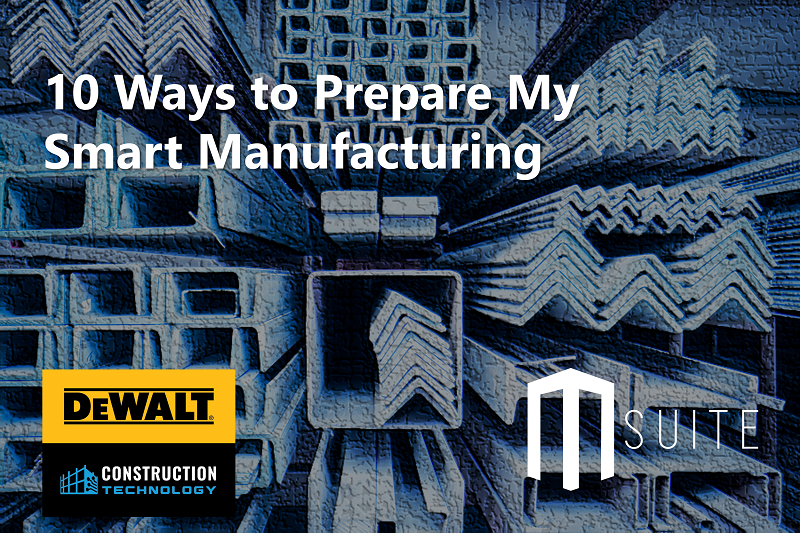Smart manufacturing integrates advanced technologies such as Artificial Intelligence (AI), the Internet of Things (IoT), Big Data analytics, and other digital technologies into the manufacturing process to make it more efficient, flexible, and agile.
Smart manufacturing is also known as Industry 4.0, which refers to the fourth industrial revolution, where technology and data are driving manufacturing. Smart manufacturing creates a fully connected, flexible, and responsive manufacturing environment that can adapt quickly to changing market demands.
With smart manufacturing, manufacturers can optimize their production processes, reduce costs, and improve the quality of their products. They can also enhance their supply chain management by gaining real-time visibility into their inventory and production processes. Additionally, smart manufacturing can help contractors reduce their environmental impact by reducing waste, energy consumption, and greenhouse gas emissions.
Overall, smart manufacturing is a transformative approach that can help manufacturers improve their competitiveness in today’s rapidly changing market.
Several technologies can be used in smart manufacturing for construction, including:
- Building Information Modeling (BIM) allows architects, engineers, and construction professionals to create a detailed 3D model of a building. BIM can be used to optimize the design and construction process, improve coordination, and reduce errors and rework.
- Fabrication shop software can help increase efficiency and profitability by streamlining various processes, reducing errors, and providing greater visibility into the shop’s operations.
- Automation fabrication cutting software (model to cut) increases machine cut accuracy and reduces substantial material waste.
- 3D Printing uses computer-aided design (CAD) to create three-dimensional objects by layering materials on each other. In construction, 3D printing can create complex shapes and components more efficiently, reducing waste and improving speed.
- Robotics can be used in construction to automate bricklaying, welding, and painting tasks. Robotics can improve productivity and quality, reduce the risk of injuries, and allow construction workers to focus on more complex tasks.
- Internet of Things (IoT) involves using sensors and connected devices to collect and analyze data in real time. In construction, IoT can monitor equipment, track materials, and improve safety by identifying potential hazards.
- Augmented Reality (AR) overlays digital info on top of the real world. In construction, AR is used to visualize designs, identify potential issues, and improve communication and collaboration.
- Drones can be used in construction to collect aerial data, monitor construction progress, and inspect hard-to-reach areas. Drones can improve safety, reduce costs, and provide valuable data for decision-making.
Overall, these technologies improve the construction process by increasing efficiency, reducing waste, improving safety, and reducing costs.
10 Ways you can prepare for Smart Manufacturing and stay ahead of the competition
- Invest in Automation Technology: Start by automating your production processes with smart machines that collect data, monitor performance, and analyze outcomes. This will help your business streamline production, improve quality control, and increase productivity.
- Integrate IoT Devices: Implement the Internet of Things (IoT) technology into your business processes to monitor and control equipment, procedures, and supply chain operations. IoT devices can provide real-time data insights to optimize your business processes.
- Develop a Digitalization Plan: Develop a comprehensive plan for digitalizing your business processes, including tracking inventory and supply chain management, process automation, and data analysis.
- Train Your Employees: Ensure that your employees are trained in the latest smart manufacturing technologies and processes to ensure that they can operate and maintain equipment and processes effectively.
- Implement Predictive Maintenance: Predictive maintenance uses data analytics to detect and predict potential equipment failures before they occur. This helps to avoid costly downtime and repairs, reducing production costs.
- Adopt a Collaborative Approach: Collaborate with other businesses and experts to develop new ideas and solutions for smart manufacturing.
- Establish a Data-Driven Culture: Develop a culture of data-driven decision-making within your organization, ensuring that all decisions are based on factual insights and analysis.
- Embrace Industry 4.0 and educate yourself. It’s a term used to describe the fourth industrial revolution, which involves the integration of intelligent technologies, IoT devices, and data analytics into the production process.
- Secure Your Data: Ensure your business data is secure and protected from cyber threats. Implement security protocols and regularly update software and hardware.
- Continuously Monitor and Improve: Monitor and improve your smart manufacturing processes to ensure your business stays ahead of the competition.
Smart Manufacturing Impact on Construction Industry?
Smart manufacturing can significantly impact the construction industry by improving productivity, efficiency, safety, and sustainability.
One of the main benefits of smart manufacturing in construction is using digital technologies to optimize the design and construction process. For example, Building Information Modeling (BIM) can create a digital representation of a building, allowing architects and builders to plan and coordinate the construction process more efficiently.
BIM can also simulate different construction scenarios and identify potential issues during pre-construction planning, reducing the risk of delays and cost overruns.
Smart manufacturing can also help construction companies optimize their supply chain management using real-time data to track materials and equipment. This can improve logistics efficiency and reduce waste by ensuring that materials are used efficiently, and that excess materials are not wasted.
Smart manufacturing can also improve safety in the construction industry by using sensors and monitoring systems to identify potential hazards and improve safety protocols. This can help reduce accidents and injuries, improving working conditions for construction workers.
Finally, smart manufacturing can help the construction industry become more sustainable by reducing waste and energy consumption. For example, prefabrication and modular construction can reduce waste by allowing for more efficient use of materials, and smart lighting and HVAC systems can reduce energy consumption by optimizing energy usage based on occupancy and environmental conditions.
Overall, smart manufacturing has the potential to revolutionize the construction industry by improving productivity, efficiency, safety, and sustainability.








